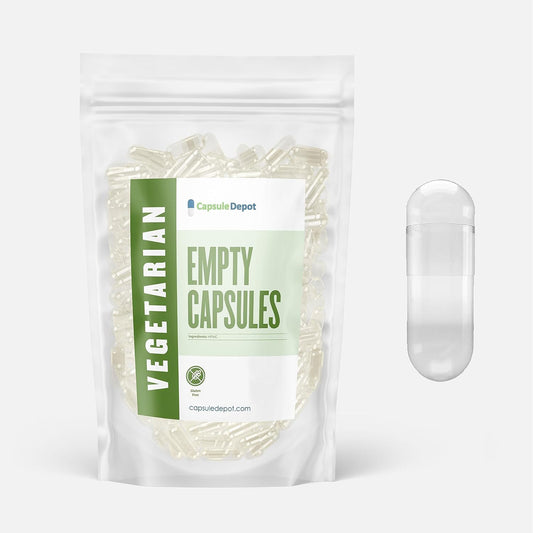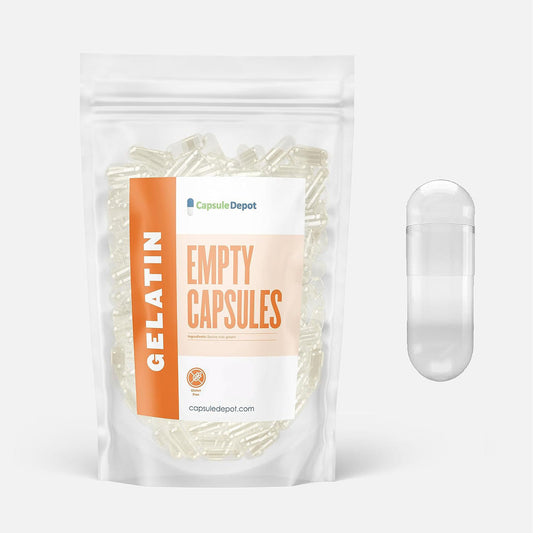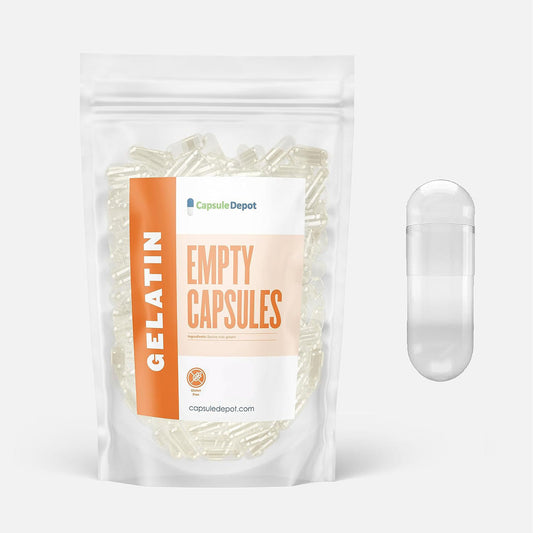Introduction
Over time, capsules have evolved through various types and applications to reflect consumer tastes and lifestyle choices.
To many consumers today, the type of capsule holding their supplement or medication is just as important as the ingredients inside. Gelatin and vegetarian capsules hold sway in the current capsule market. Therefore, as a health-conscious consumer, understanding the differences between the duo is key especially if you have dietary restrictions, ethical considerations, or are simply looking for the best option to support your wellness.
In this guide, we'll explore both capsule types' characteristics, benefits, and drawbacks, so you can make a well-informed choice that complements your lifestyle and health needs.
Understanding Vegetarian and Gelatin Capsules
Gelatin capsules

Composition:
Gelatin capsules are made from gelatin; a pure protein-like substance derived from animal collagen. Pharmaceutical-grade gelatin used in capsule production is typically sourced from bovine or porcine hides following standard processing and purification procedures. Bovine sources are considered the cleanest option in the gelatin category.
Applications and Benefits:
Gelatin capsules are produced as either a two-piece ‘hard’ capsule or a one-piece soft gel. The former is used widely for solid formulation ingredients while the latter is suitable for semisolids and non-aqueous liquids. Both hard capsules and softgels have been used extensively for decades in the pharmaceutical and nutraceutical industry offering excellent formulation delivery for diverse healthcare needs. They are also typically cheap to produce.
Drawbacks:
Although gelatin capsules are widely used across the pharmaceutical and nutraceutical industry, some consumers prefer capsules made from non-animal byproducts. Also, the restricted utility of hard gelatin capsules to solid-fill ingredients limits their application, making some manufacturers seek alternative two-piece capsules with a wider compatibility range.
Yet, despite these limitations, gelatin capsules have been successful and remained popular on the market due to their affordability, functionality, and aesthetic appeal.
Vegetarian capsules

Composition:
Vegetarian capsules are made from non-animal byproducts, especially plant-derived hydrocolloids like cellulose, hydroxypropyl methylcellulose (HPMC), pullulan, starch, agar, carrageenan, etc. HPMC capsules are the most common type of vegetarian capsules in the market due to their excellent performance. In recent times, a section of the vegetarian market has also pushed pullulan capsules up the chart.
Application and Benefits:
- Excellent performance in formulation: Vegetarian capsules offer excellent formulation delivery functions, in stability and dissolution properties. HPMC capsules may even offer superior utility compared to gelatin capsules. They demonstrate high compatibility with several fill materials including hygroscopic solids, moisture-sensitive materials, and aqueous liquids. Due to their HPMC core, they also show higher mechanical resistance to temperature and humidity fluctuations. The HPMC capsule comes only as a two-piece system.
- Wide-ranging acceptance: Given its plant-sourced raw material, vegetarian capsules appeal to a wide consumer base with dietary restrictions, ethical considerations, and cultural preferences. Particularly, HPMC capsules do not contain any allergens or GMO products, increasing their acceptability. Additionally, vegetarian capsules are closer to meeting contemporary consumer demands such as the ‘all-natural’ and ‘clean label’ specifications.
Drawbacks
- Cost: Vegetarian capsules are more expensive to produce and thus come at higher prices than their gelatin counterparts. Yet the price differences are minimal especially when you buy from us at Capsule Depot. Purchasing these empty capsules in bulk may also save you more money.
- Recency barriers: The time gap between the traditional gelatin capsules and emerging vegetarian alternatives means that many existing products have been pre-qualified based on their gelatin capsule formulation. Switching to vegetarian options comes at some cost in testing, re-registration, and approval to confirm the bioequivalence with gelatin types. Hence, vegetarian capsules are commonly used in new product development.
- Sustainability concerns: The material sourcing and production processes of vegetarian capsules have a minimal carbon footprint, compared to the gelatin alternatives, thereby meeting sustainability demands. Furthermore, reputable manufacturers ensure sustainability through ethical forestry practices, utilizing non-wood sources of cellulose, and implementing Free Trade Agreements.
Factors to consider in choosing between gelatin and vegetarian capsules
Distilling the distinctions between the two capsule types into individual choices, consider the following 5 factors when choosing between gelatin and vegetarian capsules.
Dietary Restrictions
Consider your dietary restrictions especially when protected by standardized requirements such as vegetarian, vegan, kosher, or halal laws. For instance, you may choose vegetarian capsules if you decide to avoid animal by-products completely. Otherwise, Halal and Kosher certifications may guarantee that the gelatin capsules of your choice are free of your undesired ingredients.
Allergies and Sensitivities
Although rare, gelatin can cause allergic reactions in some people. Similarly, while vegetarian materials are more hypoallergenic, excipients in the capsules may be a source of triggers. Therefore, trusted manufacturers will provide an allergy statement confirming the capsules have been tested for allergens. However, if you have any sensitivities, it is important to ensure the triggers are not contained in the capsule type of your choice.
Cost Considerations
While gelatin capsules are cheaper and get the job done, vegetarian capsules also offer a broader appeal that is worth the cost. So, considering your budget before making a choice is also a good idea. Moreover, despite the cost of vegetarian capsules, the marketability of HPMC vegetarian empty capsules is wider and very well accepted among younger and health-conscious consumers. In fact, the additional cost can be easily included in the price to the customers, as they are aware that quality and certifications cost more.

Product Integrity
Weighing how the capsule type affects the stability and efficacy of the supplement or medication is also key especially if you are making your supplements at home. Ensure your chosen capsule type matches the technical properties of your fill ingredients. For example, a vegetarian capsule is preferable if the supplement ingredient is air or moisture-sensitive.
Personal Values
Having the information and liberty to align your values such as ethical and environmental views with your capsule choice is well-placed and a central message of this guide. You may also consult experts and your health providers if you have additional concerns.
Conclusion
Eventually, the decision between vegetarian and gelatin capsules boils down to what matters most to you—whether it's dietary compatibility, ethical considerations, or product effectiveness. Both capsule options have their own set of advantages, making them suitable for different needs and preferences. As you weigh your options, consider how each aligns with your health priorities and values, ensuring that the supplements you take are not only effective but also a true reflection of your lifestyle choice. Also, remember that consulting with a healthcare professional can provide additional guidance tailored to your needs.





